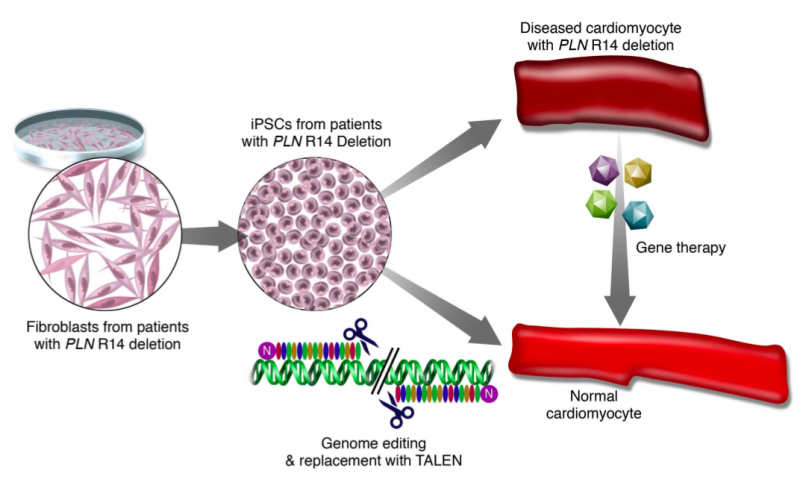Gene therapy clips out heart failure causing gene mutations

Gene therapy can clip out genetic material linked to heart failure and replace it with the normal gene in human cardiac cells, according to a study led by researchers from the Cardiovascular Research Center at Icahn School of Medicine at Mount Sinai. The study is published in the April 29 edition of Nature Communications.
"Genetic mutations, the small random, changes in the genetic code making up genes, are major culprits in the weakening heart muscle seen in patients with heart failure," says Roger J. Hajjar, MD, Director of the Cardiovascular Research Center of Mount Sinai Heart at Icahn School of Medicine at Mount Sinai. "Our study results reveal that specific forms of heart failure can now be targeted by a new kind of gene therapy that acts as 'molecular scissors' cutting out the mutation and inserting the normal genetic code in its place."
Cardiomyopathies are diseases of weakened heart muscle, which can lead to heart enlargement and heart failure. The conditions are often genetically inherited. A number of inherited gene mutations have been associated with cardiomyopathies, including mutations in the phospholamban (PLN) gene, which is a critical regulator of healthy cardiac cell function and its calcium cycling. Calcium is a critical mineral for heart muscle cells to properly contract and pump blood from the heart to the rest of the body.
The R14del mutation within the PLN gene has been identified in a number of families with genetic heart failure. The mutation is linked to dilated heart muscle, dysfunctional heart muscle contraction, dangerous arrhythmias, and the development of heart failure by middle age.
In the study, the research team collected skin cell samples from a heart failure patient who has the R14del mutation. The skin cells from the patient were then transformed in the laboratory to become induced pluripotent stem cells (iPSCs). These stem cells, which carry the genetics of the heart failure patient, were then differentiated from the skin cells into specialized heart muscle cells called cardiomyocytes (iPSC-CMs), which also carry the patient's genetic history.
Examination of these beating cardiac cells in a laboratory dish confirmed R14del mutation causes common abnormalities linked to heart failure including: improper pumping of calcium within cell compartments which can lead to enlargement of heart muscle tissue, electrical instability which can cause arrhythmias, and molecular markers which can lead to thickening of the heart muscle.
To correct the gene mutation in cardiomyocytes researchers successfully used two novel methods. First, they used a specifically designed transcription activator-like effector nucleases called TALENs to target and eliminate the presence of R14del-associated disease in cardiac cells. This genome engineering technique cut out the diseased gene and replaced it with a normal PLN gene resulting in normally functioning cardiomyocytes.
Secondly, they used an adeno-associated viral-vector (AAV) gene therapy approach with the harmful part of a virus removed to safely target the inside of cardiac cells and knock-down the abnormal PLN gene in cardiac cells and simultaneously express normal PLN gene successfully reversing disease. This method works within the diseased cardiac cells to suppress the expression of the diseased gene and express normal PLN proteins. This gene therapy approach also corrected the functional abnormalities of the cardiac cells.
"Our findings offer potentially new strategies to target and interrupt the disease causing path of the mutation associated with cardiomyopathies and heart failure," says Dr. Hajjar. "Having now corrected this heart failure gene abnormality in human cardiac cells, our research will move forward to further test this approach in vivo in animal and pre-clinical studies. We look forward to eventually testing this gene therapy approach one day to correct the gene abnormality in heart failure patients."
"This is a major breakthrough in molecular medicine and paves the way for future studies in personalized therapy for heart failure patients aiming to specifically correct their defective genes," says study co-author Litsa Kranias, PhD, of the University of Cincinnati, who first discovered the PLN gene R14del mutation in a Greek family.
"This finding has a huge impact for patients with inherited cardiac disease in the Netherlands as around 10 percent of our patients with dilated or arrhythmogenic cardiomyopathy carry this particular founder mutation," says Folkert W. Asselbergs, MD, PhD, FESC, Department of Cardiology, Division Heart & Lungs University Medical Center in Utrecht, Netherlands who provided cardiac cell samples of PLN R14del patients for the research team. The Netherlands population has a high prevalence of this mutation.



















